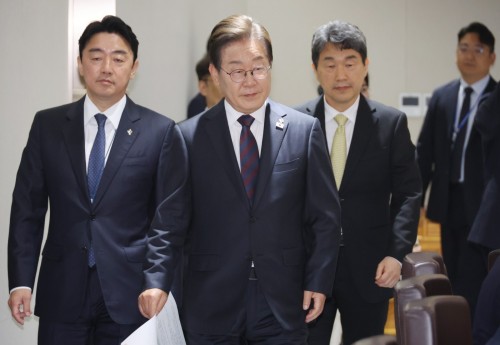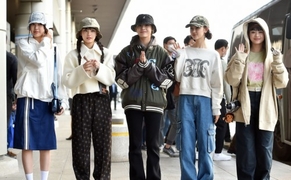 |
| President Lee Jae-myung enters the Cabinet meeting at the presidential office in Yongsan, Seoul, on June 10. / Source: Yonhap News |
The so-called "three major special counsel bills" were approved during the Cabinet meeting on June 10, marking the beginning of an unprecedented large-scale deployment of prosecutors. Inside the prosecution, concerns are mounting that once these special investigations begin in earnest, regular investigations involving public welfare may face serious delays. If special counsel teams become a permanent fixture, critics warn it could create a chaotic overlap among the Corruption Investigation Office for High-ranking Officials (CIO), prosecutors, and police, sparking a fresh round of "agencies on top of agencies" debate.
According to legal officials, the scope of the three special counsel investigations signed off by President Lee — covering the insurrection case, First Lady Kim Keon-hee’s alleged misconduct, and the death of Marine Cpl. Chae — is historically large. The insurrection case team will consist of 60 dispatched prosecutors, Kim Keon-hee’s case 40, and the Chae case 20 — totaling up to 120 prosecutors. That’s six times larger than the 2016 special counsel investigation into the Park Geun-hye administration's abuse-of-power scandal, which involved 20 prosecutors. Including special investigators and staff, the combined manpower reaches 577 people.
As of the end of February, the prosecution had 2,004 prosecutors, including 1,251 front-line prosecutors. The number assigned to the special counsel equals nearly 10% of all field prosecutors — comparable in size to entire major district offices such as the Seoul Southern District Prosecutors' Office (107 prosecutors) and the Incheon District Prosecutors' Office (115 prosecutors).
Both within and outside the prosecution, critics warn that this massive outflow of personnel will lead to serious operational disruptions. “Pulling out that many field prosecutors will undoubtedly cause backlog and delays in ongoing investigations,” said one former prosecutor-turned-lawyer. “One in every ten prosecutors will be diverted to special probes. That’s not a load you can just shift to others — regular investigations will slow down, and the public will bear the brunt.”
Legal experts also point out that if the ruling party, which holds a majority in the National Assembly, continues to push for special investigations, it risks violating the principle of separation of powers. Since prosecution authority is part of the executive branch, the legislature’s growing control over its function could be unconstitutional.
Some warn that if the administration mishandles the balance while trying to overcome the aftermath of the recent insurrection, the special probes may appear politically motivated, resembling the divisive “deep-rooted evils” purges of the past, and may trigger public backlash.
The CIO, which recently added new prosecutors to strengthen its investigative capacity, now faces staff losses again. Under the Chae case special counsel law, more than 10% of the dispatched personnel — up to 60 individuals (20 prosecutors and 40 civil servants) — must come from the CIO.
In a regular press briefing, the CIO, which is currently investigating alleged interference in the Marine’s death linked to former President Yoon Suk-yeol, stated that it “will do everything possible to pursue the truth.” It added, “Once the special counsel is launched and formally requests the case materials, we will of course comply.”
On the issue of sending prosecutors to the special counsel, the CIO commented, “This is mandated by law and not up for debate. The final size of the teams will be determined by the special prosecutors, but if personnel are pulled from our office, it will inevitably impact ongoing investigations.”
Most Read
-
1
-
2
-
3
-
4
-
5
-
6
-
7





















